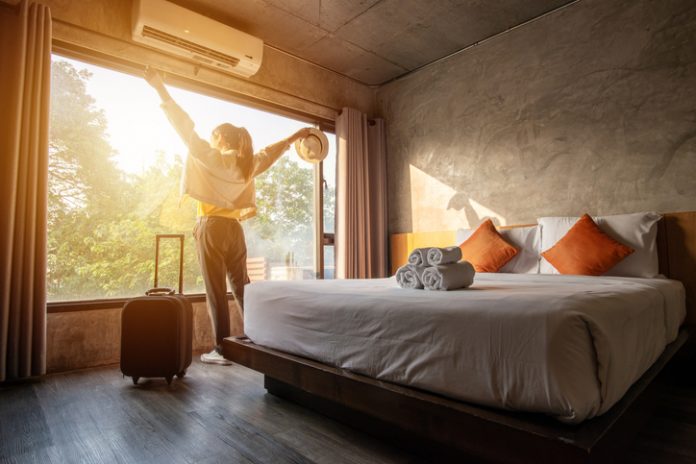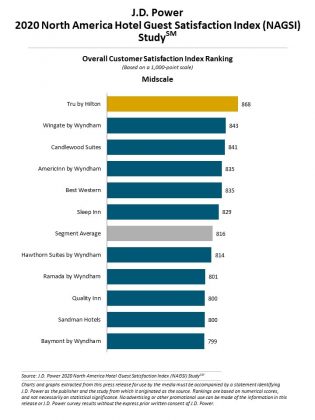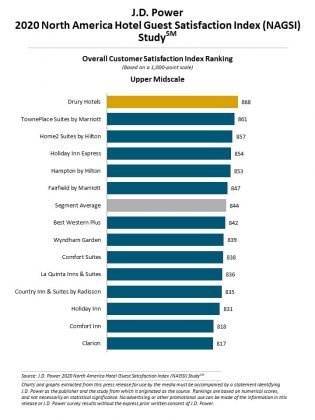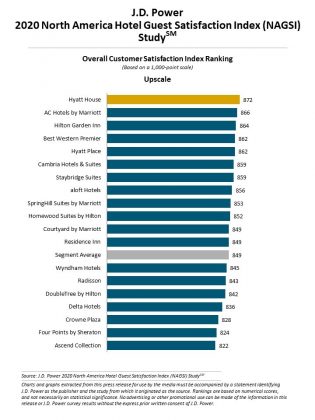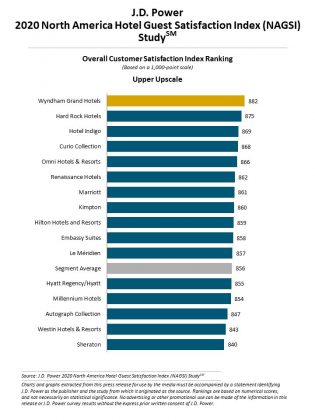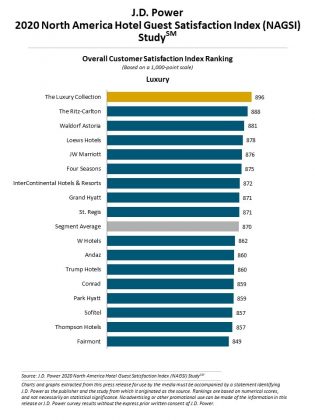TROY, Mich. — A year ago, hotel summer marketing and advertising efforts were in full swing with images of epic pools, zen-like spas, and cozy bed linens. Today, hotel ads are filled with images of electrostatic sprayers, updates on new cleaning protocols, and offers for free last-minute cancellations. These are smart moves, according to the J.D. Power 2020 North America Hotel Guest Satisfaction Index (NAGSI) Study released today, which finds that meeting guest expectations for cleanliness and proactively communicating with guests prior to arrival continue to be critical drivers of guest satisfaction.
“While the COVID-19 pandemic has certainly amplified the importance of hotel cleanliness, it has historically been an important focal point for hotel guests,” said Andrea Stokes, hospitality practice lead at J.D. Power. “In fact, satisfaction with guestroom cleanliness has been climbing steadily for many years, as most hotels already adhered to very high housekeeping standards. The other critical variable for the industry right now is proactive communication with guests—both about the specific steps hotels are taking to protect guests and about any service and amenity limitations due to COVID-19. As we continue to take the pulse of travelers during the pandemic, the ability of hotels to clearly manage guest expectations, both pre-stay and at the property, will be key to maintaining high satisfaction during this difficult period.”
The following are some key findings of the 2020 study:
Guestroom cleanliness scores reached a record high.
Guest satisfaction with the cleanliness of their room increased for a fifth consecutive year, reaching an all-time high rating of 8.53 (on a 10-point scale) in 2020. Room cleanliness was a key driver of satisfaction, as the overall satisfaction score among guests who said they were “delighted” (rating of 10 points) with the cleanliness of the guestroom averages 942 (on a 1,000-point scale) vs. an overall satisfaction score of 829 among those who were merely “pleased” (rating of eight or nine) with the cleanliness of their guestroom.
Pre-stay communications create an essential opportunity to build trust.
Overall satisfaction scores fell 66 points, on average, when no pre-stay communications were received. Based on a separate J.D. Power pulse survey conducted April 17-19 of this year, hotel efforts to inform travelers about their specific cleaning and sanitization protocols are among the most important actions hotels can take to make travelers feel comfortable.
Hotels need to be upfront about limitations.
Many hotels across North America are still operating under capacity restrictions and limitations regarding dining areas and restaurants, public pools, fitness centers, and spas. It is essential that hotels use pre-stay communications to address any limited services and amenities as well as guest safety requirements. Based on J.D. Power data collected since the beginning of the pandemic, hotel guests understand the challenges faced by the industry and value direct, honest communication now more than ever before.
Study Rankings
The following hotel brands rank highest in guest satisfaction in their respective segment:
- Luxury: The Luxury Collection
- Upper Upscale: Wyndham Grand Hotels
- Upscale: Hyatt House
- Upper Midscale: Drury Hotels (for a 15th consecutive year)
- Midscale: Tru by Hilton
- Economy: SureStay Hotel by Best Western
The 2020 North America Hotel Guest Satisfaction Index (NAGSI) Study, now in its 24th year, analyzes guest responses to more than 150 questions regarding hotel stay experiences and benchmarks the performance of 102 brands across six market segments. This year’s study is based on responses from 37,843 hotel guests for stays between May 2019 and March 2020.



